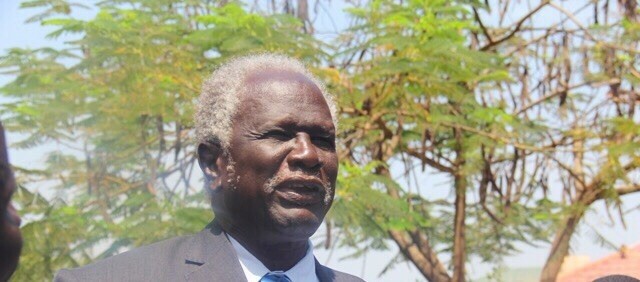The man at the helm of South Sudan’s National Elections Commission (NEC), Prof. Abednego Akok Kacuol, has outlined the challenges endangering the upcoming general elections, including unpaid rent and the urgent need for budget approval.
During an exclusive interview with Radio Tamazuj on Monday, the NEC chairperson emphasized the urgency of resolving these issues with only 11 months left.
Below are edited excerpts:
Q: Prof. Akok, what are the commission’s plans for the upcoming elections in the country?
A: The commission commenced its work in 2013 under the leadership of Honorable Elia Lomuro. Since then, we have accomplished significant tasks. After our swearing-in, we reviewed our achievements and identified priorities for the upcoming period. One immediate concern is our current office situation, facing eviction threats due to three years of unpaid rent. Resolving this issue is a priority. Additionally, since the suspension of work in the ten states post the 2013 war, we plan to revisit these areas and reinstate offices, crucial for effective operations. However, this requires budget allocation.
Secondly, we have proposed a budget to the Council of Ministers, aligned with international principles for election implementation. Funding from the presidency is crucial to avoid delays, and we are in communication with the Ministry of Finance for swift action.
Thirdly, the election timetable is critical. With only 11 months remaining, there are numerous activities, starting with civic education to inform citizens about the democratic transformation process. This requires immediate action, beginning with voter registration, a vital step in determining voter eligibility. Identifying electoral constituencies is also crucial, involving decisions from the Council of Ministers, Ministry of Justice, and National Parliament.
The current parliamentary seats comprise 50% from previous constituencies and 50% appointed, with 5% designated for presidential appointment. This requires technical and political intervention. Our role is technical, while the Council of Ministers and Parliament handle the political aspects.
We have drafted a timetable spanning from 2022 to 2023, but with only 11 months left, timely action is essential. A genuine political will, budget allocation, and security stability are critical for a successful electoral process. Coordination among different stakeholders and clear communication with security authorities are necessary.
I appeal to our authorities and citizens to recognize elections as an opportunity for democratic transformation. If conducted freely, fairly, and credibly, South Sudan will earn global respect. I invite South Sudanese groups and individuals to collaborate for the success of free, fair, and credible elections – my office is open to all.
Q: Some current members of parliament are appointed based on the revitalized peace agreement and, as they aim to be elected from their constituencies, they have activities such as census and voters’ registrations. Is the remaining time sufficient for these tasks?
A: If approached with seriousness and sincerity, the remaining time will be adequate. We need to commit to these tasks earnestly, and success will follow.
Q: What is the budget required for the electoral process in South Sudan, and has it been approved?
A: Our estimated budget for election activities is approximately $250 million.
While this figure has faced criticism, we believe it is justified given the scope of our operations in the ten states and three administrative areas. We plan to charter planes and rent cars for activities across these regions. However, achieving success hinges on serious political will and the availability of the budget. Currently, I am supposed to go to Yambio in Western Equatoria state, but the lack of means is a hindrance. Promises for tomorrow persist, but time is running out.
Q: Earlier, you mentioned the outstanding rent arrears of three years and the budget shortages preventing your travel to Yambio. How critical is this situation, and how might it impact the remaining timeline for the electoral process?
A: I appreciate your attention to detail, and I acknowledge the pivotal role of the media in conveying information to the public. It’s crucial to emphasize that the provision of the budget is paramount, and without it, our efforts will be hampered.
For instance, the newly appointed members of parliament lack essential resources, including cars. To highlight the current state, the limited facilities the commission possesses were generously donated by an American organization called ISUS, covering the rent and equipment for our office. However, it’s worth noting that these computers date back to 2013 and are not aligned with current technology standards.
The commission has communicated all these challenges to the relevant authorities, and they are aware of the difficulties we face. The collective commitment of both the public and authorities is crucial for the success of the upcoming election.




